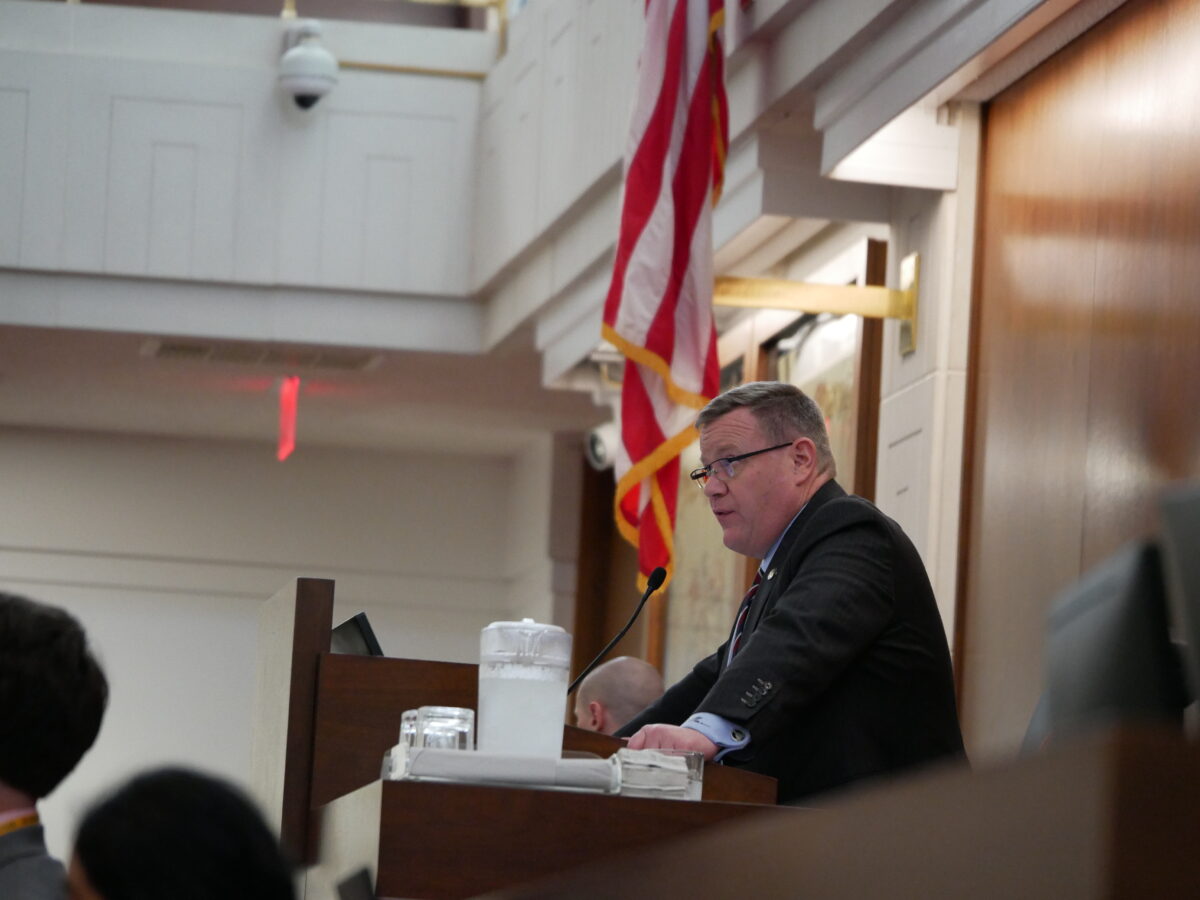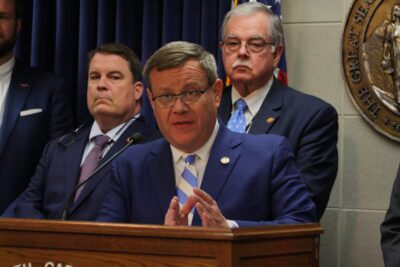

Share this story
|
|
The state House passed its budget plan Thursday with a 78-38 vote after debating its components and voting on amendments — several of which dealt with education.
“This plan provides historic funding for K-12 education, totaling 60% of the state’s total budget,” Rep. Donny Lambeth, R-Forsyth, said on the House floor Wednesday. “Our plan also expands school choice, creates more classroom transparency, directs more resources for school safety and health, reduces lunch debt, (and) provides more support for smaller school systems.”
The Senate will release, debate, and approve its plan next. Legislative leaders from both chambers then will negotiate a final budget to send to Gov. Roy Cooper for a signature or a veto.
The Republican Party now has the ability to override a gubernatorial veto after Rep. Tricia Cotham from Mecklenburg County changed her affiliation from Democratic to Republican this week.
The House budget would send $24 billion to the Department of Public Instruction for K-12 education over the next two years, including 7.5% across-the-board teacher pay raises over the biennium, plus other targeted boosts and step increases, for an average pay increase of 11.2%, a 7.5% increase for principals and non-certified staff, and an extra 2% pay increase for bus drivers. It also would restore master’s pay and establishes paid parental leave for teachers.
The education items that representatives debated most heavily this week dealt with the expansion of school choice and policies aimed at parental involvement in instructional decisions.
The budget would expand opportunity scholarships, create a commission to review academic standards separate from the State Board of Education, require educators to post materials and activities online, and form local media advisory committees to investigate challenges to classroom materials.
“Many of the policy changes in this bill feign to give voice to parents, but instead we are playing politics with our children’s futures,” Rep. Julie Von Haefen, D-Wake, said on the floor Wednesday. “At a time when teachers are already feeling immense pressure due to staff shortages and lack of resources, this bill continues to undermine the authority of the teaching profession and fails to support teachers.”
When it comes to early care and education, the budget would send $537 million to the Division of Child Development and Early Education. It would allocate $24 million in new funding to increase subsidy rates and an additional $5 million in each year for Smart Start. It also gives $10 million nonrecurring for a pilot that gives child care teachers eligibility for child care subsidies for their own children, $900,000 nonrecurring over three years to establish a three-county child care pilot, and directs $1.05 million to Wonderschool, an organization that hosts a platform for child care businesses and helps open new facilities, to support the creation of up to 300 new family child care homes.
It does not, however, include a $300 million request from the chairs of the early childhood caucus for compensation grants to avoid a fiscal cliff when federal relief funds run out.
Multiple legislators highlighted the lack of funding compared with requests from advocates and bipartisan members.
“We invest, but again, we’re not being robust,” said Rep. Robert Reives, D-Chatham, on the budget’s child care allocations. “COVID told us one thing: child care is a big deal. We talked about people not returning to the workforce — an overwhelming number of people cite the fact that they need the opportunity to have somebody to take care of their child.”
Rep. David Willis, R-Union, co-chair of the early childhood caucus and owner and operator of a child care program, pointed to the pilots he added to the plan through amendments.
“We do have a crisis across the state for many providers, and that’s something that we’ve been experiencing since before COVID,” Willis said. “There’s always room for improvement … but within this we’ve got several pieces specifically focused on child care, they’re going to do some historic things.”
Willis added that conference negotiations might lead to more early childhood items.
“There’s still work to be done,” he said. “We’ll continue to do that within the conference process with the Senate.”
The budget includes $1.5 billion for the community college system, with the same salary increases for faculty as for K-12 teachers — 4.25% in 2023-24 and 3.25% in 2024-25 — and $25.9 million for faculty recruitment and retention. It includes $16 million recurring in both years to account for enrollment growth adjustments. It also would give $25 million recurring both years to the Longleaf Commitment financial aid program.
The budget would allocate funds for workforce development, some of which are aimed at specific industries. It includes a one-time $15 million to waive registration fees for continuing education courses, $40 million for health care programs, and $30 million to support high-cost workforce programs.
“The community college continues to lead the way in realizing opportunities for its students,” Rep. James Roberson, D-Wake, said Wednesday. “Their contributions have a tremendous impact on our local, county, and state government.”
Roberson called for higher pay raises.
“I’m appreciative of what has been considered in terms of the pay raises, but I’m disappointed that these folks continue to fall behind,” he said. “We can do much better than this.”
What’s different since last week?
The House passed a few amendments this week to the plan since it was released last week.
- An amendment from Rep. John Bradford, R-Mecklenburg, Wednesday would create a teacher license specifically for Montessori teachers.
- An amendment from Rep. Frances Jackson, D-Cumberland, would pause class size reductions in fourth and fifth grades for a year to help districts struggling to find teachers to meet those requirements.
- An amendment from Rep. Hugh Blackwell, R-Burke, directs the Department of Public Instruction to study the possibility of private placements for children with special needs that require intensive care.
- An amendment from Rep. Donna White, R-Johnston, would move half of the funds ($5.5 million) for an existing high school program mitigating e-cigarettes usage, to target elementary schoolers with the same program.
“We now know from the reports from teachers, principals, parents, that students are vaping in the classroom as young as fourth and fifth grades,” White said. “… We need to stop it before it gets to high school.”
Transparency or unnecessary teacher requirements?
Several Democratic representatives unsuccessfully tried to remove elements of the budget through amendments Wednesday, including the creation of the commission on academic standards, the educator requirements to post materials and activities online, and the expansion of the opportunity scholarship program.
Rep. Amber Baker, D-Forsyth, proposed an unsuccessful amendment that would have removed the item that creates a commission to recommend academic standards to the State Board.
“This commission would be a replication of what our State Board is already responsible for doing,” Baker said.
Rep. Jeffrey Elmore, R-Alexander, Wilkes, said the commission would help parents better understand the creation of standards.
“One thing that COVID did when schools were going online totally is that parents have become a whole lot more aware of the actual instruction happening in the schools,” Elmore said. “This standards advisory commission is a way to help create transparency in the development of our state standards, which our teachers teach from with various curriculum.”
Baker said that parents already are notified about the material their children are learning and that parental involvement is part of the process of school improvement teams and district-level committees.
“As an educator, I have issue with ordinary citizens deciding what gets taught in our schools,” Baker said. “We don’t do it with the law profession. We don’t do it with the medical profession. And so transparency is one thing, overreach is another.”
A failed amendment from Rep. Gloristine Brown, D-Pitt, would have removed requirements to post classroom materials online and to form local committees to investigate challenges into instructional materials.
“It’s almost like micromanaging our schools, and we say that we have trusted our educators,” Brown said.
Elmore said the item provides “a systematic structure to how that process works,” if someone feels material is inappropriate.
Another failed amendment would have remove the reporting requirements, from Rep. Rosa Gill, D-Wake.
“The teacher shortage is at a crisis level,” Gill said, adding that additional reporting requirements would burden teachers instead of improving working conditions for recruitment and retainment.
“We’re preventing our students from receiving the quality education they deserve,” Gill said.
Rep. John Torbett, R-Gaston, defended the items, saying he has heard from parents who want more access to classroom activities and materials.
“We work for them, and when they ask something, I think it’s imperative that we listen,” Gaston said.
A failed amendment from Rep. Tim Longest, D-Wake, would have decreased the amount that parents using child care subsidies have to pay from 10% of their income to 7%. Willis said he opposed the amendment because it would make fewer subsidy slots available to families.
The decrease would save families about $5,500 annually, Longest said.
“One of my concerns with this budget is that it does not do quite enough yet to invest in the future of North Carolina,” Longest said. “There is perhaps no better example of that future than the working families who are rearing young children.”
Funding parental choice
A failed amendment from Rep. Lindsey Prather, D-Buncombe, attempted to remove the expansion of the Opportunity Scholarship program, which pays for students to attend private schools. The item expands the eligibility to students in grades three through eight who have not previously attended a public school.
“The state has a constitutional obligation to ensure that every student has access to a sounder basic education,” Prather said. “Unfortunately, the opportunity scholarship program provides public funding to unaccountable non-public institutions for the education of our students. If the state is going to provide public funding to support the education of students at a non-public school, the state is responsible for ensuring that those students are receiving a sound basic education as well. The current structure of this opportunity scholarship program does not allow for any meaningful accountability for student outcomes, nor for any rigorous evaluation of the program.”
Rep. Dean Arp, R-Union, defended the program as providing options for parents who aren’t satisfied with their children’s school.
“There’s no good reason not to afford parents of fourth through eighth grade the same choice that’s available to more affluent North Carolinians,” Arp said.
The debate on Thursday about the added requirements on educators and school choice continued, with an amendment that did not pass from Rep. Laura Budd, D-Mecklenburg, that would have required schools to hire legislative compliance coordinators to keep up with the added requirements.
Democratic representatives shared concerns with the impacts of directing public funds to non-public options on traditional public schools.
“The greatest bang for your buck is to make an amazing public education system,” Rep. Reives said. “So this isn’t just about teacher pay. This isn’t just about principal pay … Those stories are bad, but it’s about the fact that we’ve got to decide which group of people we’re going to invest in.”
Go here for more of what’s included in the budget on early care and education, K-12, and community colleges.





